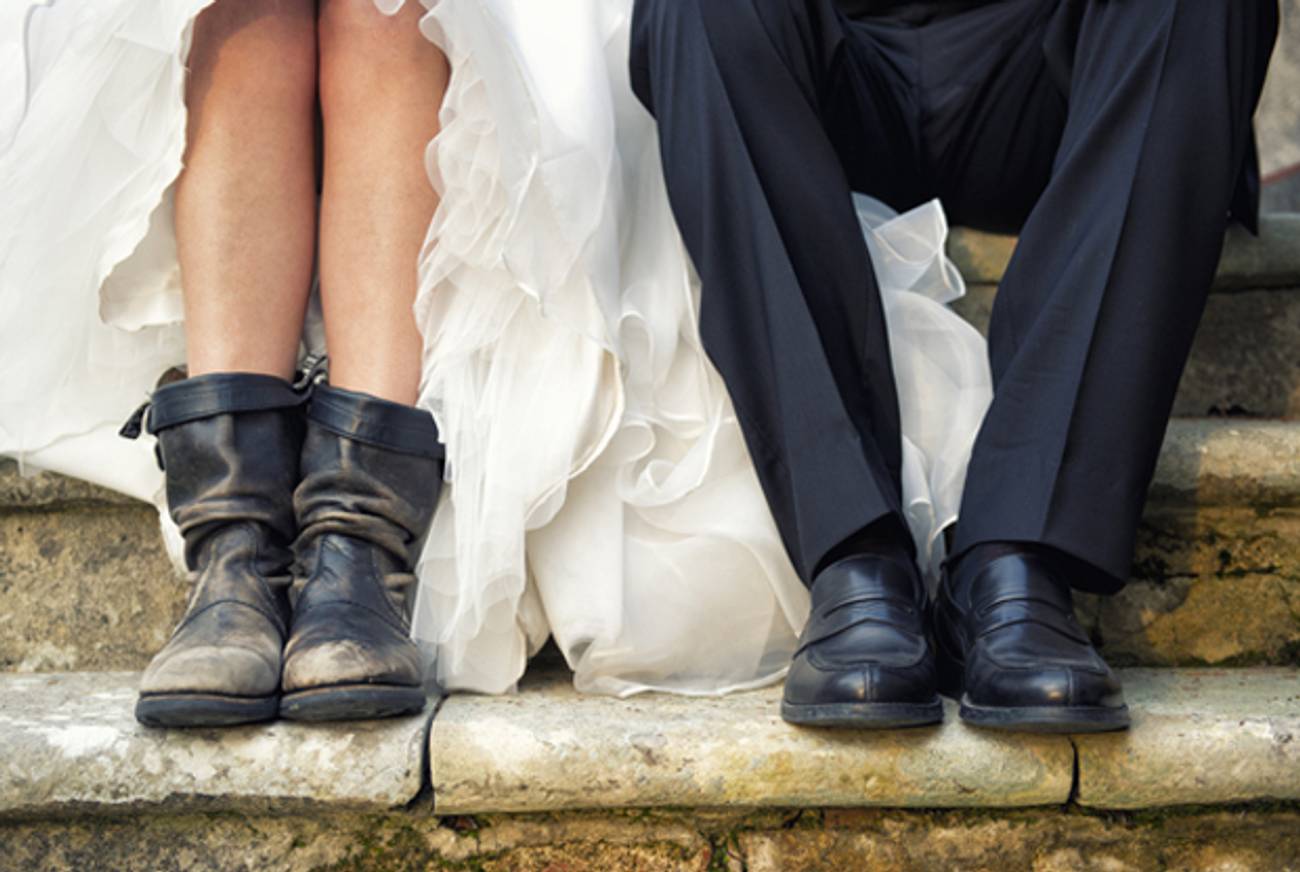Jewish Couples Head to Wedding Boot Camp
Seven-week course teaches the basics of the ceremony—and Jewish marriage




On a Tuesday evening in early November, four engaged couples gathered around a table in a kindergarten classroom at Manhattan’s 92Y. At the far end of the table, against the backdrop of a brick wall covered in finger paintings, Rabbi Hayley Siegel sat beaming at the soon-to-be brides and grooms, who had come to learn the basics of the Jewish wedding ceremony.
If there’s one thing that Siegel truly loves—even more than rap music or Mary Poppins—it’s the Jewish wedding. Her class is called Wedding Boot Camp in part because one of the incorporates training from the 92Y fitness center, but primarily because Siegel offers a rigorous overview of Jewish wedding traditions. Over the course of seven weeks, she will cover everything from the signing of the ketubah to the breaking of the glass under the chuppah. But the focus of the class extends beyond the significance of basic wedding rituals. Siegel also aims to teach her students things like how to build a healthy relationship through Jewish customs and how to navigate interactions with in-laws—essentially, how to be a mensch during a process that tends to turn otherwise sane people into whirlwinds of anxiety and stress.
That night’s installment of Wedding Boot Camp, the fourth session, focused on chesed and tikkun olam: acts of loving kindness and repairing the world. Siegel, a tiny woman with almond eyes and chestnut hair, passed out booklets packed with excerpts drawn from the Torah, the Mishnah, Aggadic texts, and Kabbalistic tradition. The first text, from the book of Genesis, told the story of Eliezer’s journey to find a wife for Abraham’s son Isaac.
“Eliezer made up a test for the potential spouse for Isaac,” Siegel explained. “He said, ‘Whoever is generous enough to feed me and my camels by drawing a lot of water, that’s the right match for Isaac.’ Then lo and behold, Rebecca appears, and she draws water for him and his camels. It starts the beginning of this Jewish tradition of looking for mentshes to marry.”
Eliezer’s matchmaking expedition is often one of the first stories that children learn at the start of their Jewish education, but Siegel walked the class through the narrative anyway. She never assumes that her students share a base level of familiarity with Jewish tradition. In fact, most members of the group found Siegel’s Wedding Boot Camp through another 92Y program called Derekh Torah, which is geared toward interfaith couples and Jews with little knowledge of their religious heritage. Plenty of rabbis in New York offer one-on-one counseling before a wedding, but when it comes to classroom-style instruction that covers the most basic aspects of the Jewish marriage ceremony, the city has surprisingly little to offer.
“The rabbi who is marrying us in Minnesota asked us to be part of a pre-marriage class, and there were no Jewish pre-marriage classes available,” said Chad, who attends the class with his fiancé, Sari. “There were secular, counseling-style classes. But we were seeking a boot camp-style class that would teach us how to start a Jewish home.”
And really, it’s the Jewish home that’s the focus of Siegel’s instruction. In her eyes, a couple’s wedding day can’t be untangled from the new life that follows. “It’s really important to see things beyond the flower arrangements, beyond the dresses, beyond the tuxes,” she explained. “Your marriage is a very important stepping stone in your life. I want my couples to be prepared for their big day and beyond, and Judaism can really provide an amazing foundation for one’s marriage and for the events to come.”
And so Siegel focused on a simple concept that is integral to the health of a marriage: kindness. She explained that the concept of chesed is often translated as “loving-kindness” because it refers to a relationship that has already been established. “Chesed is not just about holding the door open for somebody who you don’t know,” she told the group. “Chesed within the Jewish tradition implies that you are going to have a relationship with the person that you do kindness for, which is very interesting because it makes you accountable for that human element. It’s not passive.”
The class also discussed tikkun olam, another Jewish concept rooted in kindness and compassion. “Tikkun is essentially looking at something that is out of balance or out of sync with what is right and righteous in the world and looking to change that,” Siegel explained. “The mystics viewed tikkun as a way to change what’s going on supernaturally. Our actions have the power to transcend our circumstances and reach a higher level.”
Next, Siegel walked her students through a set of practical tips for implementing the concepts of chesed and tikkun olam during the wedding planning process: help out-of-town guests with travel arrangements, donate money to charities instead of buying wedding favors, use sustainable materials for the chuppah. And of course, be kind to your new spouse.
“This goes without saying, but show love to the person that you’re getting married to on the day of your wedding,” Siegel said with a laugh. “I couldn’t find any specific Jewish wisdom, so I leave you with the wisdom of Bruno Mars.” She solicited one of her students to read the chorus of the pop star’s hit song “Just the Way You Are,” which Siegel suggested the couples repeat to one another on their wedding day:
When I see your face,
there’s not a thing I would change.
Because you’re amazing just the way you are.
“That’s poetry!” Siegel exclaimed. “That’s beautiful!”
And with that, the session was over. As she watched her students began gather their belongings, Siegel reiterated the central point of the night’s class: “In every action, be a mensch.”
The first session of the next 92Y Wedding Boot Camp begins Jan 13. 2015.
Brigit Katz is an editorial intern at Tablet.